
 i_need_contribute
i_need_contribute

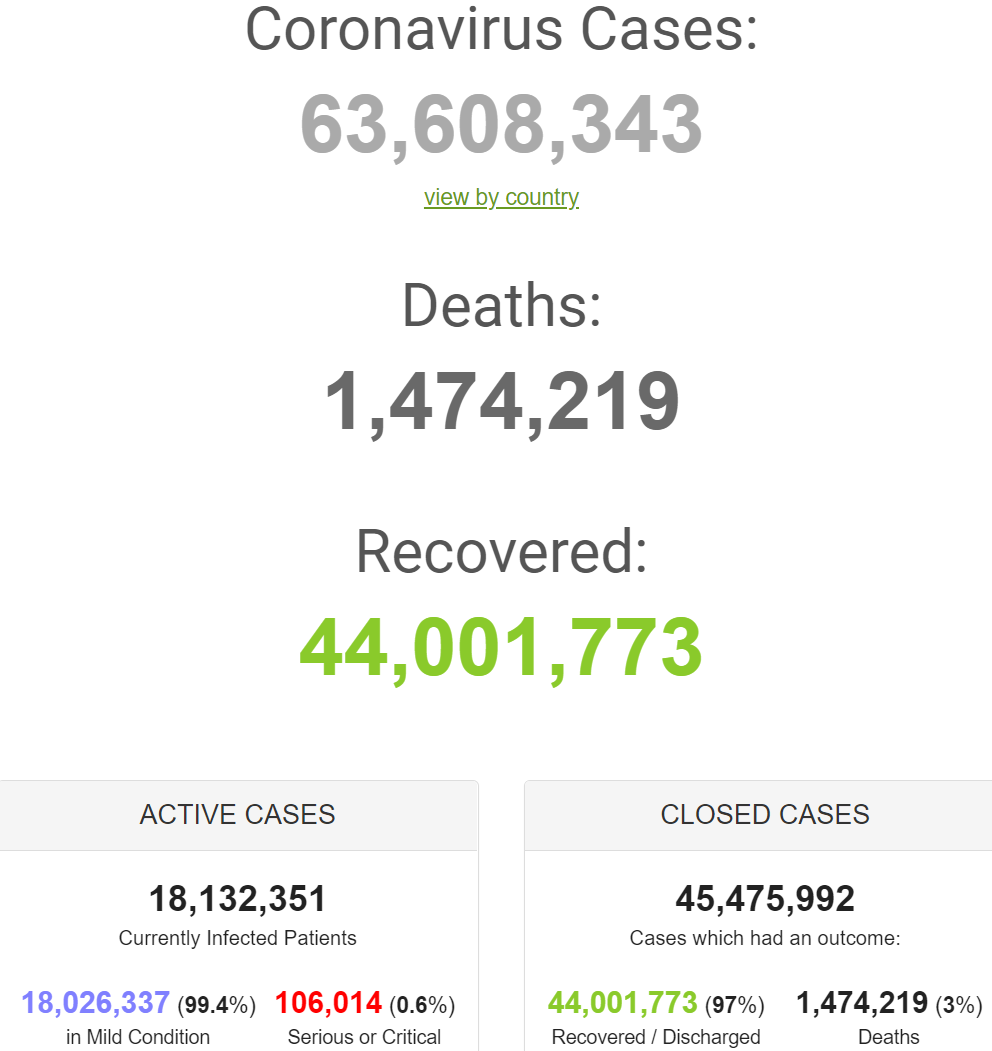
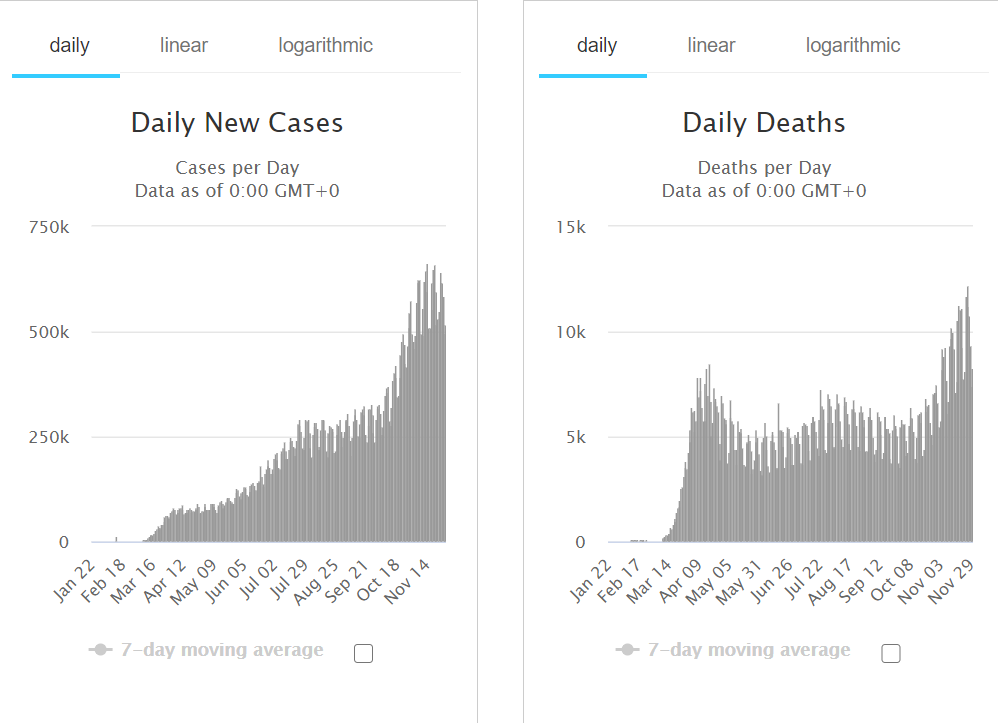
|
Country, |
Total |
New |
Total |
|
World |
63,578,650 |
+496,380 |
1,473,457 |
|
13,920,038 |
+161,736 |
274,332 |
|
|
9,463,254 |
+31,179 |
137,659 |
|
|
6,336,278 |
+21,538 |
173,165 |
|
|
2,295,654 |
+26,338 |
39,895 |
|
|
2,222,488 |
+4,005 |
52,731 |
|
|
1,664,945 |
+6,659 |
45,069 |
|
|
1,629,657 |
+12,330 |
58,448 |
|
|
1,601,554 |
+16,377 |
55,576 |
|
|
1,424,533 |
+5,726 |
38,730 |
|
|
1,316,806 |
+8,430 |
36,766 |
|
|
1,107,071 |
+6,388 |
105,655 |
|
|
1,069,763 |
+14,156 |
16,862 |
|
|
990,811 |
+5,733 |
17,150 |
|
|
963,605 |
+1,075 |
35,966 |
|
|
962,070 |
+13,321 |
48,246 |
|
|
790,004 |
+2,302 |
21,535 |
|
|
732,625 |
+9,946 |
12,327 |
|
|
638,847 |
+31,219 |
13,746 |
|
|
576,599 |
+2,151 |
16,547 |
|
|
552,549 |
+2,114 |
12,258 |
|
|
551,743 |
+1,313 |
15,410 |
|
|
538,883 |
+4,617 |
16,945 |
|
|
523,478 |
+4,568 |
9,376 |
|
|
523,298 |
+3,575 |
8,295 |
|
|
475,362 |
+3,826 |
11,331 |
|
|
464,932 |
+2,525 |
6,644 |
|
|
431,630 |
+1,773 |
8,392 |
|
|
398,024 |
+2,839 |
8,025 |
|
|
378,139 |
+7,861 |
12,130 |
|
|
357,360 |
+232 |
5,896 |
|
|
356,336 |
+2,533 |
5,846 |
|
|
336,846 |
+1,248 |
2,865 |
|
|
298,061 |
+3,262 |
4,505 |
|
|
282,456 |
+2,748 |
3,184 |
|
|
233,452 |
+1,474 |
1,508 |
|
|
219,430 |
+5,123 |
2,751 |
|
|
217,122 |
+5,595 |
4,823 |
|
|
192,685 |
+568 |
13,461 |
|
|
175,438 |
+6,224 |
1,604 |
|
|
168,860 |
+1,107 |
572 |
|
|
165,806 |
+1,077 |
3,079 |
|
|
146,760 |
+2,107 |
2,119 |
|
|
145,300 |
+2,814 |
4,035 |
|
|
144,622 |
+30 |
8,952 |
|
|
Dominican |
143,988 |
+515 |
2,331 |
|
142,635 |
+209 |
880 |
|
|
139,638 |
+539 |
1,726 |
|
|
138,833 |
+185 |
237 |
|
|
136,647 |
+1,639 |
1,158 |
|
|
135,584 |
+3,216 |
1,267 |
|
|
135,124 |
+356 |
2,164 |
|
|
131,659 |
+794 |
1,990 |
|
|
128,442 |
+1,830 |
1,786 |
|
|
127,944 |
+1,000 |
1,018 |
|
|
123,699 |
+215 |
1,423 |
|
|
122,062 |
+91 |
4,171 |
|
|
121,176 |
+2,981 |
1,392 |
|
|
115,911 |
+370 |
6,650 |
|
|
110,074 |
+540 |
1,706 |
|
|
107,888 |
+375 |
2,909 |
|
|
107,364 |
+347 |
2,304 |
|
|
105,929 |
+196 |
839 |
|
|
105,271 |
+1,044 |
2,406 |
|
|
102,394 |
+354 |
897 |
|
|
96,769 |
+518 |
3,260 |
|
|
90,713 |
+1,227 |
1,941 |
|
|
86,956 |
+169 |
341 |
|
|
86,530 |
+18 |
4,634 |
|
|
85,647 |
+2,062 |
732 |
|
|
83,618 |
+302 |
1,469 |
|
|
83,199 |
+978 |
2,431 |
|
|
82,809 |
+379 |
1,183 |
|
|
82,424 |
+518 |
1,756 |
|
|
80,481 |
+1,129 |
837 |
|
|
75,814 |
+433 |
1,435 |
|
|
73,041 |
+171 |
608 |
|
|
72,807 |
+380 |
1,271 |
|
|
72,544 |
+303 |
2,053 |
|
|
67,557 |
+145 |
1,173 |
|
|
65,697 |
+1,212 |
360 |
|
|
61,878 |
+335 |
1,763 |
|
|
61,325 |
+1,136 |
506 |
|
|
58,218 |
+5 |
29 |
|
|
51,667 |
+98 |
323 |
|
|
38,182 |
+557 |
810 |
|
|
36,150 |
+322 |
332 |
|
|
35,265 |
+384 |
499 |
|
|
34,678 |
+139 |
321 |
|
|
34,201 |
+377 |
526 |
|
|
27,904 |
+11 |
908 |
|
|
24,912 |
+283 |
399 |
|
|
4,845 |
+7 |
45 |
|
|
3,998 |
+21 |
60 |
|
|
1,347 |
+4 |
35 |
Retrieved from: https://www.worldometers.info/coronavirus/
From CNN's Maggie Fox
The coronavirus may invade the brain through nerve cells in the nose, German researchers reported Monday.
Autopsy results from 33 people who died of coronavirus showed the virus in the brain and in the nasopharynx -- the upper part of the throat where it connects to the nasal cavity. The researchers found high concentrations of virus in the tissue associated with smell (the olfactory mucosa).
Why this matters: The findings can help explain some of the neurological symptoms of coronavirus infection -- notably, the loss of smell that so many people experience, the researchers reported in the journal Nature Neuroscience.
They might also help explain symptoms such as headache, fatigue, vomiting and nausea, according to Frank Heppner of the Berlin Institute of Health.
How the study was done: The researchers sampled tissue from the patients and used imaging to see RNA from the virus. They found evidence the virus travels along the nerves from the cells lining the throat and sinuses to the brain.
“Lower levels of viral RNA were found in the cornea, conjunctiva (eyes) and oral mucosa, highlighting the oral and ophthalmic routes as additional potential sites of SARS-CoV-2 central nervous system entry,” they wrote.
It’s not a surprising finding -- researchers have suspected the coronavirus gets into the central nervous system this way. Other viruses do, too, including flu. The German study is unique in that imaging was used to catch the virus in the act.
From CNN Health’s Lauren Mascarenhas
People who receive a coronavirus vaccine should expect “low grade” side effects, Dr. Anthony Fauci said Monday.
“When you get an injection of the vaccine, you induce a response. In some people, they don't feel anything,” the director of the National Institute of Allergy and Infectious Diseases told Facebook CEO Mark Zuckerberg Monday.
“Others feel an ache in the arm. Some may feel an ache in the arm and kind of a little chilly feeling, almost like you have a flu-like syndrome, and in a minority of people that get a fever. They'll actually get a fever for a day.”
“Almost all of this goes away within 24 or at the most, 48 hours,” he added.
It’s important to be honest with people about the side effects they may experience, said Fauci.
“What the body is telling you by that response is that it's responding well to the injection,” he said.
From CNN Health’s Lauren Mascarenhas
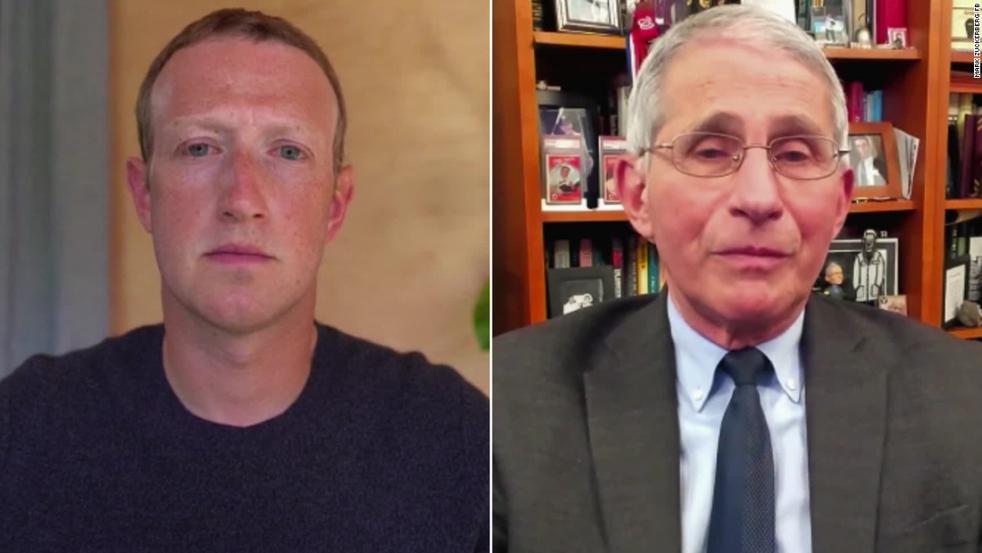
Mark Zuckerberg and Dr. Anthony Fauci. Source: Mark Zuckerberg FB
After many Americans traveled and gathered with people living outside of their households for Thanksgiving, Dr. Anthony Fauci urged people to do things differently over the rest of the holiday season.
“I actually think that we need to, this time, do things a little bit differently,” Fauci told Facebook CEO Mark Zuckerberg Monday.
Fauci, the director of the National Institute of Allergy and Infectious Diseases, acknowledged that it will be difficult for people to stay apart over the holidays.
“That seems to be unfortunately … the antithesis of the Christmas, the New Year, the Hanukkah season, because you really want to bring friends, the warmth, the fireplace, the people sitting down together,” he said. “Unfortunately, that's the perfect setup for people who may have no symptoms and innocently and inadvertently come into the home and infect someone.”
Fauci said that people should consider whether they have friends and family who are susceptible to the virus.
“If you do, do you really want to take the chance of exposing that person to something that might not allow them to have future Christmases and New Years and Hanukkahs?” he asked.
Retrieved from: https://edition.cnn.com/world/live-news/coronavirus-pandemic-12-01-20-intl/index.html
Associated Press in Colombo
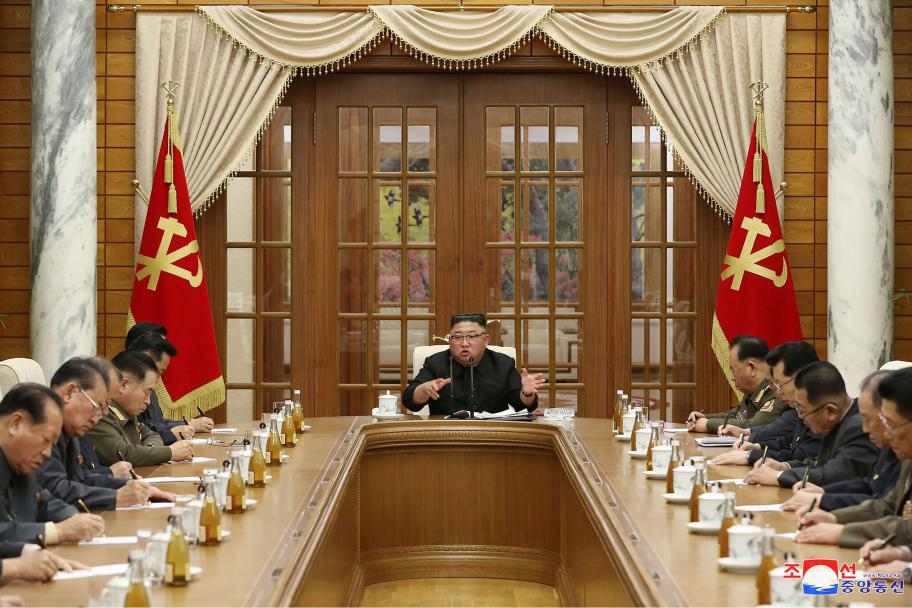
Kim Jong-un met with government officials on Sunday, seen in this photo provided by the North Korean government.Credit...Korean Central News Agency/Korea News Service, via Associated Press
North Korea’s leader Kim Jong-un “harshly criticized” his government agencies for mishandling the economy, the country’s state media reported on Monday, as new data revealed just how much the pandemic had slashed the country’s already dwindling trade with China.
Signs had already emerged earlier this month that North Korea’s economic trouble was deepening, driven by long-standing international sanctions and the impact of the pandemic. According to customs data released by Beijing last week, North Korea’s imports from China from January to October plummeted by 76 percent to $487 million, while its exports shrank 74 percent to $45 million in the same period.
China is North Korea’s only major trading partner, accounting for more than 90 percent of its external trade. In October, the North’s import from China amounted to a mere $253,000, nearly a 99-percent drop from the previous month. South Korean officials and analysts have warned that a sharp decline in imports from China in recent months could drive up domestic prices in the North.
The Chinese government only records official trade and does not cover smuggling that takes place across the borders between the two neighbors. Still, the figures provided fresh evidence that the coronavirus was squeezing the North Korean economy more effectively than international sanctions ever have.
During a meeting of the Workers’ Party that Mr. Kim presided over on Sunday, the government agencies responsible for the economy were harshly criticized for “failing to provide scientific guidance” and “failing to overcome subjectivism and formalism in their work,” the North’s official Korean Central News Agency reported.
But this was not the first time Mr. Kim has admitted to his country’s deepening economic woes, acknowledging in August that his five-year plan for economic growth had failed. Mr. Kim all but sealed North Korea’s borders with China earlier this year over fears of the potentially catastrophic consequences the pandemic could inflict on the country’s poor health system.
North Korea insists that it has registered no coronavirus cases, but outside experts remain skeptical.
Retrieved from: https://www.nytimes.com/live/2020/11/30/world/covid-19-coronavirus/the-pandemic-has-slashed-north-koreas-already-dwindling-trade-with-china
Sarah Boseley and Jessica Elgot
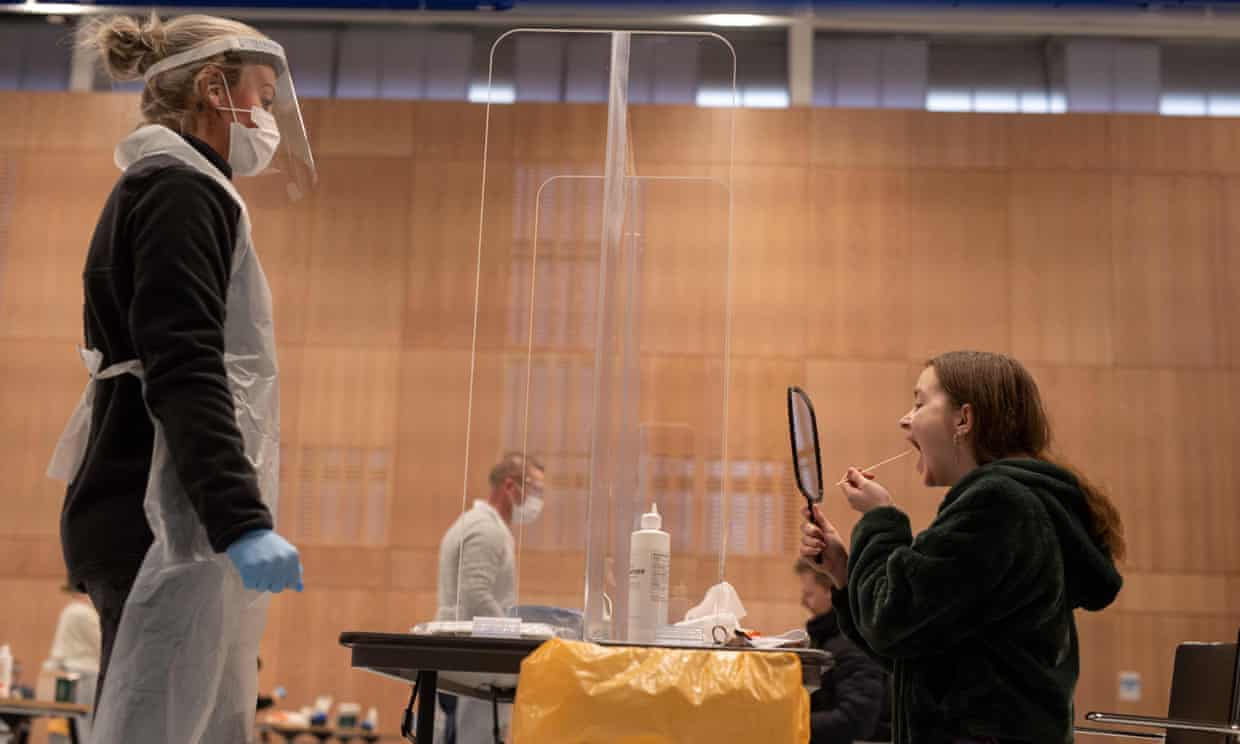
A student at the University of Hull self-administers a swab for a quick-response lateral flow test.
Photograph: Oli Scarff/AFP/Getty Images
Local authorities in tier 3, with the toughest Covid restrictions, will be invited to apply for funds to run mass testing programmes of people with no symptoms, in hopes of driving down the virus and moving to tier 2, the government has said.
Public health directors will be able to put forward proposals for testing in those parts of their communities most at risk from the virus, if they so choose, which could be particular neighbourhoods or workplaces where infection rates are high.
It would be open to them if they wanted to focus on particular ethnic minority communities, where there have been high death rates, if there was evidence they were more at risk or that an outbreak had originated in one community, with priority groups decided by local councils and directors of public health, the Department of Health and Social Care said.
The programmes will run for six weeks and be supported by the government. They follow the mass testing pilot rolled out in Liverpool, which is said to have driven down the prevalence of the virus. However, testing in Liverpool was organised and supervised by the army. Other towns have already said they do not have the staff needed to run mass testing.
Gen Sir Gordon Messenger, head of operations for the programme, said at a Downing Street press conference that most areas would have to use their own people and resources. Military support of the kind that Liverpool had would be “simply undeliverable” for all of the country.
“I can say with confidence that cannot be replicated around the country, and therefore the military support, along with all other types of central support, has to be targeted where it’s needed most and where it can have the greatest effect,” he said.
“I have absolutely no doubt that the military will continue to play a really important part in the community testing programme but the baseline assumption in terms of workforce generation is that that will be delivered locally with considerable support from the centre.”
Messenger also said he did not yet know how many of the 23 million people going into tier 3 after lockdown ends on Wednesday would be able to access the regime, as “planning is still very much under way”. But he said that capabilities will “sequence over time”, adding this would be into “January and beyond”.
The testing will involve rapid lateral flow tests, which give a result in about 20 minutes. They are not as accurate as the gold-standard PCR test, which is run in a lab or mobile unit and takes considerably longer.
But the health secretary, Matt Hancock, told the briefing testing was vital and could drive the virus levels down in tier 3 cities.
“By expanding our testing to include people showing no symptoms, we are finding more positive cases more quickly and breaking chains of transmission,” he said. “Up to a third of people have coronavirus without symptoms, so it is incredibly important to be testing those who could be infecting others unknowingly.
“When more people come forward for regular community testing, we have a much greater chance of driving down prevalence of the virus and saving lives.
“I know people in the top tiers are facing a particularly difficult time, which is why we are supporting them with mass community testing to provide a route towards lowering the level of restrictions they face.”
Retrieved from: https://www.theguardian.com/world/2020/dec/01/funds-for-mass-covid-testing-offered-to-local-authorities-in-tier-3

Factory output, allied to optimism about Covid vaccines, has helped to boost stock markets fresh from the best November for 19 years. Photograph: Sipa Asia/REX/Shutterstock
Hopes that the world will bounce back from the ravages of coronavirus in the new year have been buoyed by strong growth in output from Asia’s huge manufacturing centres, led by an accelerating post-pandemic boom in China.
China’s Caixin/Markit manufacturing purchasing managers’ Index (PMI) rose to 54.9 from October’s 53.6, marking the highest level since November 2010. The gauge stayed well above the 50-level – which separates growth from contraction – for the seventh consecutive month.
A steady recovery in global demand also helped Japan’s factory activity move a notch closer to stabilisation in November, while in South Korea the same metric grew at the fastest pace in nearly a decade.
The final au Jibun Bank Japan Manufacturing PMI hit 49.0 in November, up from the previous month’s 48.7, and South Korea’s IHS Markit PMI rose to 52.9 in November.
Factory activity also grew in Taiwan and Indonesia, a sign the pick-up in Chinese demand was underpinning the region’s economy.
The strong showing of the region’s factories, allied to widespread optimism about the potential positive impact of Covid-19 vaccination programs in developed countries, also helped to boost stock markets fresh from the best November for 19 years.
MSCI’s broadest index of Asia-Pacific shares outside Japan added 0.26% on Tuesday after closing the month 9% higher. Japan’s Nikkei was 0.9% higher on Tuesday while the Kospi index was up 1.4% in Seoul. China’s blue-chip CSI300 index was 0.72% higher on Tuesday,
In Australia, the central bank held rates at near-zero amid signs the country’s easy monetary and fiscal policies have helped it weather the pandemic.
Figures released on Tuesday showed that house prices, one of Australia’s favourite economic indicators, have begun to rise again, bringing the promise of greater consumer confidence and more building work. The benchmark ASX200 index was up more than 1%.
“We’ve seen clearly a huge wave of liquidity coming to equities in response to the vaccine news and in response to US election news,” said Hamish Tadgell, a portfolio manager at SG Hiscock & Company.
“But there are still risks, and as a result we could see the market pull back, I think, particularly as we come into sort of the Christmas period.”
Capital Economics said that the boom in China could fade a little in the coming months, but it was expected that the government in Beijing would continue to offer plenty of policy stimulus while strong global demand for Chinese-made consumer goods also provided a good impetus.
“In the near term, we think supportive fiscal policy and strong foreign demand should keep industrial growth robust,” said China economist Julian Evans-Pritchard in a note on Tuesday. “The economy is likely to remain above-trend in the coming months.
Although Wall Street closed weaker on Monday as investors cashed in their November gains, the S&P500 looks set to start Tuesday up by 0.8%. In London the FTSE100 is expected to open up 0.56% at the bell after its best month since 1989.
“There was profit taking around the world so we ended a record month with a whimper not a bang, and you know, taking a little bit of a breather,” said Interactive Brokers chief strategist Steve Sosnick.
“I think that markets are pricing in, if not fully pricing a recovery, they are pricing in the vast majority of it [and] it’s very hard to meet these elevated expectations.”
The US dollar was under pressure on Tuesday, after closing out its worst month since July with a little bounce and as investors anticipated that the US Federal Reserve would have to produce yet more monetary easing.
Oil prices were slightly lower on uncertainty about whether the world’s major oil producers would agree to extend deep output cuts at talks this week. Brent crude futures were largely unchanged at $47.86.
Retrieved from: https://www.theguardian.com/business/2020/dec/01/asian-manufacturing-boom-offers-hope-for-swifter-global-recovery-from-covid
· The director general of the World Health Organization has warned that spending time with friends and family at Christmas is “not worth putting them or yourself at risk”. Tedros Adhanom Ghebreyesus, the body’s director general, said people should consider whether travelling during the festive period is necessary.
· France has seen its death toll rise by 406 to 52,731. Its health ministry said there were 4,005 new cases, fewer than on Sunday. It has also seen a fall in people in intensive care, and in the numbers admitted to hospital due to the virus. The country’s seven-day average of daily new infections stands at 11,118, an almost two-month low.
· Brazil’s health ministry has confirmed 21,138 new cases of Covid-19 and 287 deaths. Earlier on Monday, the WHO urged its government to be “very, very serious” about its rising coronavirus infection numbers, as more than 170,000 have now been killed.
· Opec will hold a second day of talks on Tuesday, as the oil producers’ club hopes to reach an agreement over cuts to production. Demand has been affected by the pandemic, with the current Opec president, Abdelmadjid Attar, saying it had caused “immense challenges”.
· Rating agency Moody’s has said that most countries still face a “significant negative shock” from the pandemic, and vaccine trials have not caused it to change its forecasts.
· Labour will abstain in a vote on England’s new coronavirus tier system on Tuesday over a disagreement on support for the hospitality sector.
· Colombia will keep its land and river borders closed until 16 January in an attempt to stem Covid’s spread.
· Serbia is to start tests of Russia’s Sputnik V vaccine, as it continues talks with Pfizer about purchasing the jab. Laboratories will get 20 doses this week for testing, according to a statement from the country’s prime minister, Ana Brnabić.
· Mexico is in a “bad shape” as coronavirus cases and deaths surge, according to the WHO. The country’s death rally is now more than 105,500 and confirmed cases have passed 1.1 million. Public health experts believe it is likely to be significantly higher.
Retrieved from: https://www.theguardian.com/world/live/2020/nov/30/coronavirus-live-news-dr-fauci-warns-of-surge-upon-surge-in-us-cases-after-thanksgiving